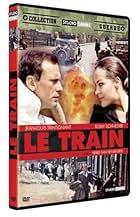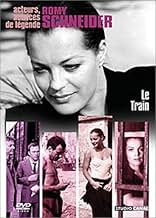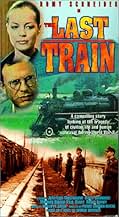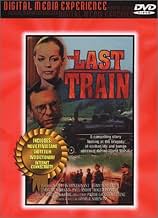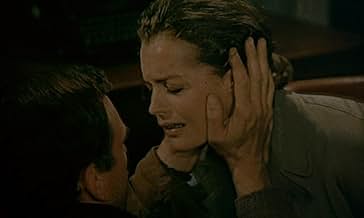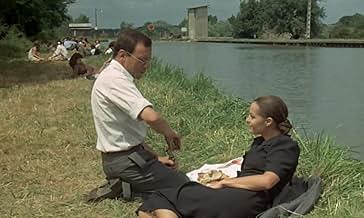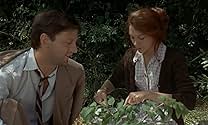IMDb रेटिंग
6.9/10
1.9 हज़ार
आपकी रेटिंग
अपनी भाषा में प्लॉट जोड़ेंTwo people, a Frenchman Julien Maroyeur and a Jewish German woman (Anna Kupfer) met on a train while escaping the German army entering France.Two people, a Frenchman Julien Maroyeur and a Jewish German woman (Anna Kupfer) met on a train while escaping the German army entering France.Two people, a Frenchman Julien Maroyeur and a Jewish German woman (Anna Kupfer) met on a train while escaping the German army entering France.
- पुरस्कार
- कुल 1 नामांकन
फ़ीचर्ड समीक्षाएं
I saw the film especially as admirer of Romy Schneider. I was seduced , again, by her presence and the close ups serve , in beautiful way, this cause. Her Anne , defined by bad experiences, becoming part of a story of survive and one of love, proposing a manner to resist to pressures and fears, educated , in some measure, in some form, a simple man, losting, for a period, his family, is just fair.
A war film , a trip , in the womb of a train under attacks of Nazi airplanes, a splendid scene about persecution against Jews , a great portraits of characters and inspired - dramatic end.
A beautiful film about experiences, love, refuges and radical decisions . And admirable job of Romy Schneider and Jean Louis Trintignant.
A war film , a trip , in the womb of a train under attacks of Nazi airplanes, a splendid scene about persecution against Jews , a great portraits of characters and inspired - dramatic end.
A beautiful film about experiences, love, refuges and radical decisions . And admirable job of Romy Schneider and Jean Louis Trintignant.
And also the most known French film about the 1940 French exodus, trying to escape from the Nazi invasion. You had EN MAI FAIS CE QU'IL TE PLAIT, back in 2015, also a very good movie, with the same settings. The other strength of this movie, besides the gripping story, is that the director Granier Deferre was only 13 years old at this time and actually lived this tragic period. So, he was the best placed to provide many of accurate details, that would probably not have been shown in another feature. For instance, those women who took advantage of the train stop, in the middle of the country side, to take a pee, in a field. Then a nazi plane arrives and bombards the area. Three seconds later after the smoke has left, we see the two cadavers of the poor women. Or the scene of a man, also taking a pee, standing between wagons, during a train stop ( of course;;;) Some folks have said that you have some lengths in the film, I agree, but in this kind of feature, lengths are sometimes unavoidable. If you had filled this film with plenty of action sequences, would that had been credible? Hell no. A memorable ending that would have made, even a Waffen SS trooper weep. Believe me.
two great actors. subtle revelation of each role nuance. a touching beautiful war film. a delicate precise work. and little more. because its virtue is honest courage to present not only a love story in war time but to describe, softly, a tragedy of many people. lost of houses for preserve life. cruelty as manner to survive. need of the other not only as protection but like proof of your existence. a woman. and a man. the waters of sentimental link. strange beauty of Romy Schneider and the drawing of a man out of his universe presented by Jean Louis Trintignant. the silence. the crumbs of words. the silence. and last meeting. as seed for new dimension of life. that is all.
10myschrec
May 1940. The Germans invade France and thousands flee on trains heading for safety. A man is separated from his pregnant wife and young daughter. He meets a woman on the train and protects her. She is a German Jew -- suspected by the French -- and wanted by the Nazis.
With actual footage from WWII, this film feels more like a documentary, which of course adds to the drama. The characters -- even the minor ones -- are well drawn and evoke sympathy. Romy Schneider -- a beauty in so many other films -- displays her incredible acting prowess. And Jean-Louis Trintignant, who became well known after "Z" (1969) and "The Conformist" (1970), is incredible: low-keyed, soft-spoken and poignant. Can two people fall in love so quickly? Under such dire circumstances that keep getting worse, this strange romance seems so real.
For the most part, this is not a Holocaust film ... nor a film about Nazi atrocities. But the fear of German aggression is palpable. One character tells another -- as they see the results of the German aircraft bombing: "Close your eyes, you'll never know it happened." This is what all refugees desire -- to escape and forget. But this is a film that doesn't want you to forget the prejudice, selfishness, and other horrors of war. But it also reminds you of the gentleness and humankindness.
"It's them. I'd recognize that sound anywhere." I am reminded of the Holocaust survivor who could not sleep for years because of the sounds she heard in her dreams/nightmares.
The last seven minutes are some of the most frightening and intelligent minutes dealing with the Holocaust even put on film The scene is fraught with danger and filled with possibilities. The ethical dilemma will generate hours of thought and discussion.
With actual footage from WWII, this film feels more like a documentary, which of course adds to the drama. The characters -- even the minor ones -- are well drawn and evoke sympathy. Romy Schneider -- a beauty in so many other films -- displays her incredible acting prowess. And Jean-Louis Trintignant, who became well known after "Z" (1969) and "The Conformist" (1970), is incredible: low-keyed, soft-spoken and poignant. Can two people fall in love so quickly? Under such dire circumstances that keep getting worse, this strange romance seems so real.
For the most part, this is not a Holocaust film ... nor a film about Nazi atrocities. But the fear of German aggression is palpable. One character tells another -- as they see the results of the German aircraft bombing: "Close your eyes, you'll never know it happened." This is what all refugees desire -- to escape and forget. But this is a film that doesn't want you to forget the prejudice, selfishness, and other horrors of war. But it also reminds you of the gentleness and humankindness.
"It's them. I'd recognize that sound anywhere." I am reminded of the Holocaust survivor who could not sleep for years because of the sounds she heard in her dreams/nightmares.
The last seven minutes are some of the most frightening and intelligent minutes dealing with the Holocaust even put on film The scene is fraught with danger and filled with possibilities. The ethical dilemma will generate hours of thought and discussion.
In th seventies,Granier-Deferre became the "cinema De Qualité " director par excellence ;more accessible and less pretentious than Claude Sautet after "Max Et Les Ferrailleurs " ,his career really began in the early sixties with two estimable movies with Jean Gabin ("La Horse" and "Le Chat"),he continued with craftsman works such as "La Veuve Couderc" or "Le Train" ,both Georges Simenon's books transferred to the screen.
It may explain the "detective story" ending,which may seem a bit irrelevant in a realistic movie,but it is saved by the talent of the two principals,Schneider and Trintignant,injecting more emotion into the scene than you might think possible.
This is an apt title,for most of the movie takes place on a train,a train full of people running away from the German armies in 1940 (the beginning recalls René Clément's "Jeux Interdits" (1952).The screenwriters made no bones about criticizing French cowardliness and selfishness;it was before "Lacombe Lucien" to be precise ;As the character played by Maurice Biraud remarks :"we're afraid,we are fleeing,so we don't fight each other,get it?" On the train,the characters are stereotypes,particularly the hooker played by Regine ,probably inspired by Maupassant's "Boule De Suif",the unwed mother (oddly portrayed by cerebral (who said tedious?) Anne Wiazemsky,two sex maniacs ("when I look at you (the whore),I look like a beast !- even when you don't!);the Jewish German (Schneider),the average man (Trintignant).
An user complained that this man in the street should leave his pregnant wife and his little girl for a while and sleep with the German woman:in a world gone mad,anything can happen ,it would never have happened,had this electrician continued his routine life .
Following René Clément's steps in "Jeux Interdits" ,GD smartly integrates black and white archives films which ,with a careful editing ,turn color when the director returns to his fiction.Which his predecessor was not able to do.
It may explain the "detective story" ending,which may seem a bit irrelevant in a realistic movie,but it is saved by the talent of the two principals,Schneider and Trintignant,injecting more emotion into the scene than you might think possible.
This is an apt title,for most of the movie takes place on a train,a train full of people running away from the German armies in 1940 (the beginning recalls René Clément's "Jeux Interdits" (1952).The screenwriters made no bones about criticizing French cowardliness and selfishness;it was before "Lacombe Lucien" to be precise ;As the character played by Maurice Biraud remarks :"we're afraid,we are fleeing,so we don't fight each other,get it?" On the train,the characters are stereotypes,particularly the hooker played by Regine ,probably inspired by Maupassant's "Boule De Suif",the unwed mother (oddly portrayed by cerebral (who said tedious?) Anne Wiazemsky,two sex maniacs ("when I look at you (the whore),I look like a beast !- even when you don't!);the Jewish German (Schneider),the average man (Trintignant).
An user complained that this man in the street should leave his pregnant wife and his little girl for a while and sleep with the German woman:in a world gone mad,anything can happen ,it would never have happened,had this electrician continued his routine life .
Following René Clément's steps in "Jeux Interdits" ,GD smartly integrates black and white archives films which ,with a careful editing ,turn color when the director returns to his fiction.Which his predecessor was not able to do.
क्या आपको पता है
- ट्रिवियाAs Granier-Deferre had been part of the Exodus (at the age of 13), he was able to add a lot of personal observations to his description of the flight (such as people remaining cheerful despite the tragedy of the situation, nuns picking flowers in a field during a bombing raid, ...)
- कनेक्शनFeatured in Romy, femme libre (2022)
- साउंडट्रैकL'Attaque
Written and Performed by Philippe Sarde Et Orchestre
टॉप पसंद
रेटिंग देने के लिए साइन-इन करें और वैयक्तिकृत सुझावों के लिए वॉचलिस्ट करें
- How long is The Last Train?Alexa द्वारा संचालित
विवरण
- रिलीज़ की तारीख़
- कंट्री ऑफ़ ओरिजिन
- भाषा
- इस रूप में भी जाना जाता है
- The Last Train
- फ़िल्माने की जगहें
- Saincaize-Meauce, Nièvre, फ़्रांस(mined railroad bridge)
- उत्पादन कंपनियां
- IMDbPro पर और कंपनी क्रेडिट देखें
- चलने की अवधि
- 1 घं 35 मि(95 min)
- रंग
- ध्वनि मिश्रण
- पक्ष अनुपात
- 1.66 : 1
इस पेज में योगदान दें
किसी बदलाव का सुझाव दें या अनुपलब्ध कॉन्टेंट जोड़ें

